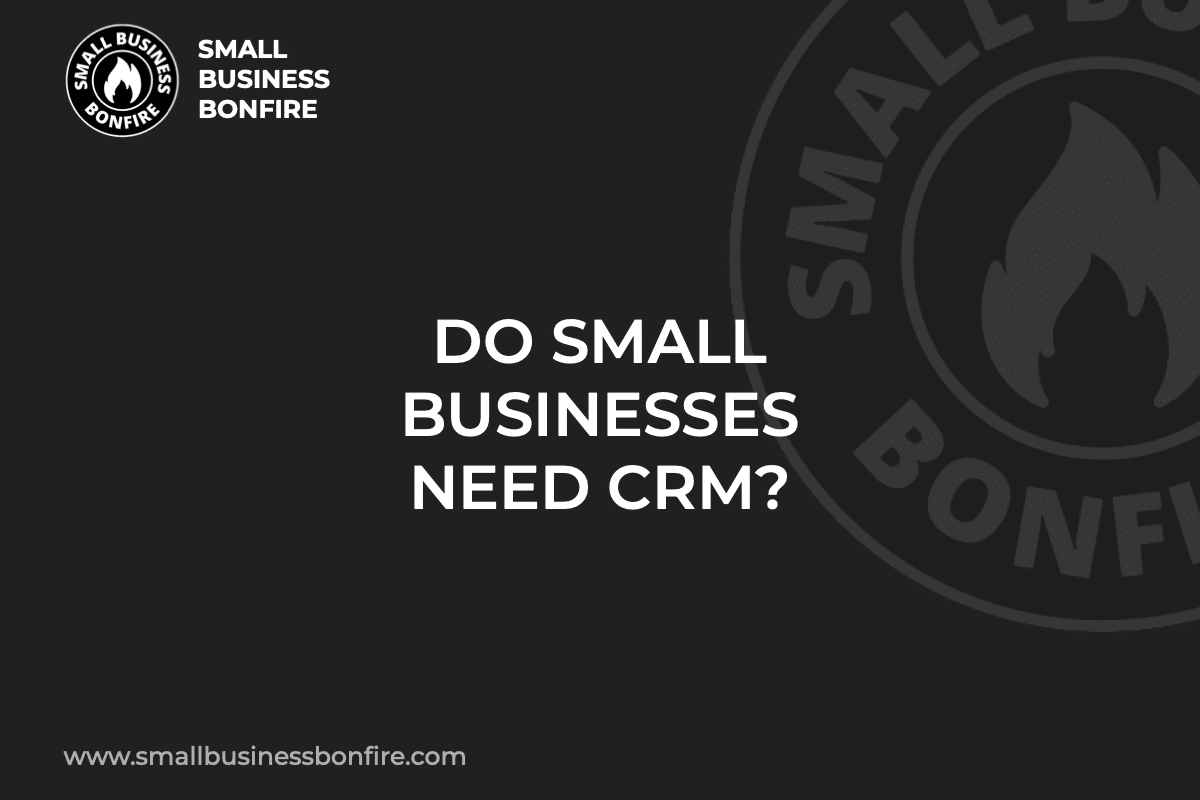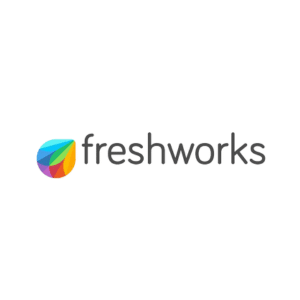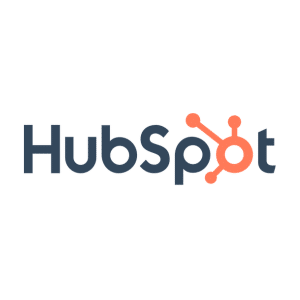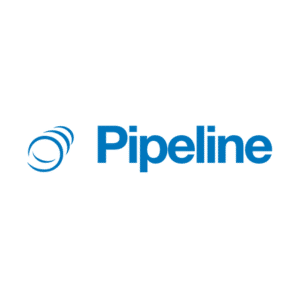Are you looking for every and any way to improve your business metrics? You may have considered CRM software but aren’t sure if it’s a necessity.
Choosing a CRM can be confusing, especially when you’re unsure if you even need it.
Hi! My name is AJ. I recently sold my business for multiple seven figures. One thing I learned throughout years of mistakes and failures is the importance of understanding your target audience!
I started Small Business Bonfire (SBB) to help entrepreneurs achieve their goals and avoid the mistakes that I made in the past.
Are you on the fence about investing in CRM? Stick with me as I explain what CRMs are and how they can help YOU find success.
Key Takeaways
- CRMs organize customer data, creating in-depth profiles for each individual.
- CRM software is highly flexible, meaning there is a provider for almost every business!
- A CRM makes it easier to communicate with your potential and current customers.
- CRMs work best for companies with dedicated sales, marketing, or customer support departments.
Related Reading: Best CRM for Small Businesses
SBB Featured Partners
What is a CRM for Small Businesses?
What is a CRM? Customer relationship management (CRM) software helps small businesses manage and optimize customer interactions and relationships.
A CRM system can store data for existing and potential customers, allowing businesses to understand better who they’re selling to.
Some forms of data a small business can collect using a CRM tool include the following:
- Customer behaviors and patterns
- Amount of time a customer has been with your business
- Purchase records
- Social media activity and interactions
- Notes on previous sales interactions
After collecting information, your sales and marketing teams can create targeted ad campaigns, improve customer segmentation systems, and boost customer satisfaction.
CRM software allows a small business to track behaviors and activities to build a better customer experience.
Lastly, CRM solutions collect information from multiple channels, like social media and email marketing campaigns.
What are the Benefits of a CRM for Small Business?
There are many CRM benefits for small business owners.
Not only can a CRM solution provide valuable customer insights, but it can also show users how to streamline business processes using automation.
Below is a list of benefits you MUST review if you’re considering a CRM system!
Let’s take a look!
CRMs Organize Customer Data
Nothing’s more frustrating than searching multiple places for different pieces of a customer profile.
Fortunately, CRM software effortlessly organizes customer data, ensuring you have everything you need to learn about people’s likes, shopping patterns, etc.
Organized data is highly beneficial because it leads to the following business improvements:
- Better-targeted marketing campaigns
- Higher customer satisfaction rates
- Accurate sales forecasting
- Better customer service
- Streamlined sales operations
Every successful business requires organized data, and CRM systems make this priority simple!
With CRM, Personalized Communication is a Breeze
CRM systems are extremely versatile; there’s no doubt about it.
However, CRM stands for customer relationship management, and improving customer relationships is the software’s top benefit.
Small business CRM software collects and manages your company’s customer information, including details like:
- Basic contact information
- Demographics
- Purchase history with your company
- Customer service records
CRMs ensure all the information you need is in a central location.
That way, ALL your employees can access the data they need, not just a few departments.
As a result, your customer support team has a 360-degree profile of each person who has interacted with your brand.
And when support agents have in-depth data, you can avoid lackluster customer service.
CRM Helps Segments Customers
CRM software can help your small business segment customers based on their purchase history and other data.
In doing so, you and your sales team can better target promotions and offers to the right people at the right time.
Personalized campaigns are more successful, driving up customer satisfaction rates!
Additionally, improving customer segmentation efforts ensure your company categorizes potential customers efficiently.
That way, you clearly understand the likelier leads to purchase your products or services.
With a CRM, You Can Monitor the Sales Process
The sales process isn’t always linear.
CRM software helps small businesses track the entire sales pipeline, from identifying leads to closing deals.
Also, the best CRMs come with tools like reports and dashboards that help you identify and eliminate any sales funnel bottlenecks in your current system.
Monitoring your sales process ensures sales reps complete their work and that your company has an efficient customer lifecycle.
Additionally, keeping track of your sales process ensures your company continually improves and quickly ends inefficient practices.
CRM Automate Reporting
CRM software can generate automated reports on customer interactions and other critical data.
With automated reporting, small business owners can access accurate insights into customer behavior and sales trends.
These capabilities save time because your team doesn’t have to create manual reports and give you the information you need for data-driven decisions.
Also, using a CRM tool allows you to track customer interactions over time.
Automated sales reports compile all the data your reps demand to close more deals.
CRM Aligns Sales and Marketing Teams
CRM software ensures sales and marketing teams stay in sync.
Here’s how it works:
By automating processes and providing visibility into customer trends, CRMs ensure the two departments communicate effectively.
Moreover, small businesses can create automated campaigns using CRM insights to target prospects better.
When sales and marketing departments work together and utilize the same information, your business secures more sales and streamlines the sales process.
Additionally, your company can create more customer loyalty because shoppers prefer personalized experiences (which you can offer when everyone is on the same page)!
CRM Prevents Missed Leads
Small businesses often struggle to keep up with their customers as their target audience expands.
Fortunately, a CRM system can identify missed leads and help your company stay on track.
CRM software allows you to set reminders for customer follow-ups, meaning you’ll never miss out on an opportunity!
That way, your sales team can contact potential customers appropriately.
A CRM tool can also give you data on which leads will likely turn into actual deals.
By leveraging such insights, your team can quickly close sales and meet corporate revenue targets!
CRM Improves Sales Planning
Sales planning is extremely important if your company wants to reach its goals.
With CRM software, small businesses can identify and prioritize opportunities with the most potential by leveraging customer data.
Moreover, a CRM system makes developing an effective sales plan more manageable because you’ll have detailed customer data.
Put simply, CRM software creates a centralized database with organized data, meaning your sales department can create a step-by-step sales process efficiently.
CRM Improves Sales Team Performance
Sales team performance is a crucial indicator of business success.
CRM software helps small businesses improve sales teams’ performance in multiple ways.
For example, CRM software provides data-driven insights that help you identify the most efficient processes and strategies to maximize revenue.
Also, CRM systems track reps’ activities, meaning managers can quickly reward good performance and address any underperformance.
Finally, a CRM system has features like gamification, which boosts sales team morale and helps reps reach their goals.
How Do You Know Your Business Needs a CRM?
Are there signs indicating it’s time to get customer relationship management software?
Can you implement a new CRM system too early?
Here are six signs it’s time for your business to invest in small business CRM!
You Can’t Keep Up With Lead Flow
A good sign your business needs a CRM system is when your sales department can’t keep up with its leads.
Your sales pipeline should be able to quickly move customers through its stages.
When current or potential customers are stuck in the sales funnel, it leads to poor reviews and lost sales.
So, CRMs are an excellent decision if your company takes on more leads than it can handle!
You Can’t Locate Your Customer Data
A huge telltale sign your company needs CRM software, like, yesterday, is when your team can’t locate customer information.
If team members scrambling to locate purchase history, basic contact information, or customer service notes is a regular occurrence, that’s concerning.
CRMs organize information and keep it in a single location.
That way, your team doesn’t have to switch between multiple programs just to communicate with a customer clearly.
Instead, a CRM system creates in-depth customer profiles that everyone on your team can access!
Say goodbye to high customer turnover rates and poor satisfaction reviews!
A CRM system can do the following:
- Increase customer lifetime
- Improve customer retention
- Improve contact management
- Expand your customer base
You Have Several Valuable Customer Accounts
If your business has several valuable customer accounts, it’s time to use a CRM system.
CRMs help small businesses monitor key accounts and track customer behavior.
That way, your team can take full advantage of potential revenue opportunities faster!
Additionally, you’ll have more control over up-selling products and services because you can segment customer data.
Segmenting your customer base allows you to customize offers based on individual customer needs, ultimately driving higher sales figures!
Your Sales and Marketing Team Aren’t Cooperating
If your sales and marketing teams aren’t cooperating, they’re not doing their job correctly.
Your company needs a CRM solution to ensure these departments are in sync and have access to the same data.
CRM software helps you create seamless processes like customer onboarding and personalizing offerings for prospects or existing customers.
Plus, you won’t have to worry about teams using duplicated data!
Why is it so crucial for your sales and marketing departments to cooperate?
When these departments work cohesively, your business can enjoy the following things:
- Better, more targeted marketing campaigns
- Fewer bottlenecks in the sales process
- Higher customer loyalty rates
- Fewer ineffective marketing campaigns
- A more cohesive business strategy
- Overall business growth
- Happier and more productive employees
When two departments don’t communicate or work together nicely, it makes everybody’s life more difficult.
Additionally, low cooperation leads to unhappy customers and more lost sales!
Use a CRM to see your marketing and sales departments work in harmony, mutually benefitting one another!
Your Customer Support Team is Lacking
I can’t stress enough how vital excellent customer support is for your business!
Consumers place significant value on an excellent shopping experience in today’s world.
What defines an above-and-beyond shopping experience? Here are some things consumers expect:
- Fast, almost immediate responses to their questions
- 24/7 customer support
- In-depth product descriptions
- Multiple ways to contact customer service (live chat, phone calls, etc.)
- Helpful, knowledgeable, and approachable staff
- Personalized conversations
Essentially, if your team isn’t offering an outstanding customer experience, you’re business is falling behind the competition.
Fortunately, a small business CRM solution can help with this!
CRMs create comprehensive profiles of your customers, keeping track of every important detail.
That way, when a customer connects with a customer support agent, your employee already understands this person and knows the answer they’re searching for.
The faster your team handles customer service inquiries, the better experience they can create!
You’re Unable to Scale Your Business
Finally, if your small business can’t scale its operations, it’s time to invest in a CRM platform.
CRMs help you manage more leads and customers without growing the size of your team!
Moreover, this technology can provide powerful insights to identify problems in your sales and marketing strategies.
You’ll also be able to observe trends in customer behavior and use that data for better decision-making.
Ultimately, a CRM tool can help you take your small business to the next level by streamlining your operations and offering personalized experiences to customers.
Which Industries Benefit from a CRM?
CRM systems are highly customizable.
Therefore, this technology can help businesses thrive and improve their operations in ANY industry.
From e-Commerce stores to healthcare businesses, it’s almost impossible to name an industry that wouldn’t benefit from CRM.
Any small business that deals with customers must have CRM technology.
Some popular CRM features small and medium business owners enjoy include the following:
- Marketing automation
- Automated sales reports
- Task management software
- Deals management software
- Dashboards
- Organized customer contact database
- Sales pipeline data and optimization
The CRM industry has grown rapidly in the past ten years, generating billions of dollars annually.
Why is CRM technology so popular?
The answer is simple. CRMs do what they’re designed to do!
CRMs bring in more customers, close deals faster, streamline business processes, and improve employee communication.
Although CRM software has some downsides, the benefits outweigh them significantly.
As beneficial as CRMs are, it’s crucial to understand that implementing the technology is a lengthy process.
Creating a CRM implementation plan is vital to success and employee adoption.
This plan ensures your employees have enough time to learn and understand the software before using it daily.
The most common reason businesses abandon CRM technology is because employees struggle to learn its functions.
Therefore, carefully plan how your company will implement its CRM system (you’ll thank me later)!
What Types of Businesses Benefit Most from a CRM?
Businesses in various industries can benefit from CRM capabilities.
However, there are specific kinds of companies that really benefit from this technology, including the following:
- Businesses with a dedicated sales team
- Businesses with a dedicated marketing team
- Businesses with a dedicated support team
Let’s learn how CRM technology helps businesses in each of these situations!
Businesses with a Dedicated Sales Team
Companies with dedicated sales staff can benefit significantly from a CRM.
For example, CRMs help companies manage their contacts and leads.
Additionally, CRMs can streamline sales processes and identify weak points and inefficiencies.
Therefore, you aren’t stuck wondering if your process efficiently converts a potential customer to a paying one.
Instead, the CRM creates in-depth reports and alerts showing what you’re doing right and what you can improve.
Lastly, CRMs can indicate trends and predict future sales using customer information.
Therefore, your team can make data-driven decisions instead of guessing, resulting in more revenue and less stress!
Businesses with a Dedicated Marketing Team
CRMs also help businesses with a dedicated marketing team.
By understanding customer behavior, companies can target and segment leads for personalized emails or other ad campaigns.
Your business will be able to create highly targeted content that resonates with customers more effectively than generic messages.
Plus, CRMs can track the performance of your messages and content to learn what works best for your customers.
You can also automate parts of your marketing strategy, such as:
- Segmentation
- Scheduling social media posts
- Setting reminders for meetings, deadlines, etc.
- Generating reports
Put simply, CRMs ensure each marketing strategy operates at its highest potential.
As a result, your small business attracts more customers and makes more sales.
Businesses with a Dedicated Support Team
Finally, businesses with dedicated support teams will love using CRMs.
This technology helps create an organized customer database that stores contact details, past conversations, and more.
Your team then has one place to search for customer information quickly.
Plus, CRMs can help businesses automate support processes such as:
- Responding to customers across multiple channels
- Segmenting customers based on their needs
- Tracking customer inquiries
- Generating reports on customer feedback
Automation helps your support team provide better service while improving efficiency and productivity.
Customer support is essential to building meaningful customer relationships.
Therefore, utilizing all the tools possible to create excellent customer experiences is vital.
Who knows, the superiority of your customer service may be what converts a potential customer into a lifelong brand ambassador!
What Will Happen to a Business Without A CRM?
A small business can still be successful without a CRM.
However, CRMs often elevate companies, allowing them to expand their reach and increase sales.
Additionally, if a company doesn’t use CRM technology, they are at a greater risk of the following things:
- Continually implementing ineffective marketing efforts
- Missing out on customers and customer segments
- Failing to create loyal customers
- Missing out on sales pipeline improvements
- Practicing inefficient business processes
A CRM can make or break a company. And if a small business needs help with things like data organization, sales inefficiencies, and lack of employee communication, CRM software can help!
CRMs can’t fix all your problems immediately. But give it some time, and you’ll notice your employees will close deals faster, communicate better, and improve customer retention rates.
The Bottom Line
So, does your small business need a CRM? Only if you want to boost sales, implement effective marketing tactics, make your employees happier, and build meaningful customer connections!
CRMs are versatile systems that can adapt to almost any type of business. Therefore, if you’re unsure about finding a CRM provider, I promise there’s one for you!
Remember, CRM implementation takes time, but when you have a plan and set schedule, the process goes much smoother (trust me, I’ve been there).
What type of CRM software will you implement? Let us know in the comments section below!
And good luck finding the right provider for you! If you need help, check out one of our MANY in-depth CRM reviews!
Newsletter Signup
Join The Leads Field Guide Newsletter for tips, strategies and (free) resources for growing your leads, and closing more deals.




